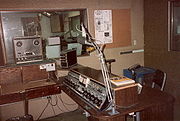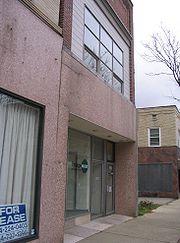
WGBN
Encyclopedia
WGBN is a U.S.
gospel music
radio station
serving the Pittsburgh, Pennsylvania
market. The station, which is owned by Pentecostal Temple Development Corporation, broadcasts at 1150 kHz with a power level of 1,000 watt
s daytime and 70 watts night, and using a two-tower directional antenna system. WGBN is licensed to New Kensington, Pennsylvania
. Owned and Operated by the Assistant to the Bishop Reverend Dr. Loran E. Mann, who is a former Pittsburgh radio and TV personality (primarily at WPXI-TV), and is still seen occasionally on Pittsburgh-based Cornerstone Television
.
.
WKPA was launched in 1940 as a typical, small-town radio station of its day. Local news, sports, and talk from the steel town of New Kensington, Pennsylvania
, 20 miles northeast of downtown Pittsburgh. The station began at 810 Fifth Avenue, New Kensington, on the second floor of a two-story building that also housed a music store on the ground floor. Cooper Brothers, the owners of the music store, operated WKPA under the corporate name of Allegheny-Kiski Broadcasting Company, with Edward Kroen serving as the station's general manager and program director.
The Cooper family sold the station on July 2, 1964 to Pittsburgh entrepreneur Nelson L. Goldberg
, who by then worked for the Cooper family as WKPA's general manager. Goldberg operated the station until its 1990 sale as Gateway Broadcasting Enterprises, Inc., not to be confused with Gateway Communications, which at that time owned a television station in Altoona, though both companies had roots in television.



Goldberg’s career began in radio sales at WKPA-AM in New Kensington. In 1958, at the age of 28, Goldberg became General Manager of WKPA
and then purchased the station in 1964. Goldberg acquired WYDD-FM in 1963 and operated the radio stations for more than 25 years. Goldberg developed WEFB-TV (TV3) and Westmoreland Cable in 1968, one of the first cable franchises in western Pennsylvania. The cable system was later sold to Comcast Corporation.
In the 1980s, Goldberg was the first to privately own satellite transponders and perceptively anticipated the advent of commercial television satellite broadcasting. Throughout his career, he continuously broke ground in developing new kinds of broadcast programming and the manner in which they were transmitted. As his company's reputation grew, so did that of WKPA.
Corporation in the late '80s; the transaction was not completed until early 1990. When Salem assumed ownership, WKPA and WYDD (which by this time had become known as Top 40 rocker WNRJ
) immediately underwent changes: WYDD switched from Top 40 to an easy listening format and the subsequent call letter change to WEZE-FM, with WKPA simulcasting WEZE's programming Monday through Friday, with existing weekend oldies and ethnic programming as its only original programming. WEZE-FM moved its studios to suburban Pittsburgh in the spring of 1991, leaving WKPA at its Fifth Avenue location, but continuing the simulcast. Later that year, Salem officials announced that WEZE-FM would drop its easy listening format for Christian Talk, the benchmark format for the other corporate-owned stations. As part of the change, WKPA would have to originate its own programming as part of the contract deals Salem had with its client ministries. Salem appointed a former WEZE-FM announcer, Ken Hawk (who at 21 became one of the youngest radio executives in commercial radio history. Brian Mroziak at nearby WMBS
was later another) to manage WKPA's operations. Under Hawk's direction, WKPA brought back a live adult contemporary morning show with local news and talk, plus a nationally syndicated talk format for weekday programming. The oldies and ethnic programming remained untouched. The rebirth of WKPA was successful but short-lived, with Salem spinning off WKPA to Pentecostal Temple Development Corporation in November 1992 to meet Federal Communications Commission
(FCC) ownership limits so that it could pursue acquisition of heritage Christian-formatted competitor WPIT
-AM/FM.
-TV field reporter) Dr. D. Loran Mann, who changed the format to Black Gospel and the station's call letters to WGBN, the call letters to stand for the Gospel Broadcasting Network. The station made history as the first full-time gospel-formatted station in the Pittsburgh market (others followed with little success) and remains so today. Stacy Taylor, the Minister of Music, has hosted the morning show since the station's inception in 1992, and the remainder of the programming is made up of sermons from Pentecostal Temple, and music is provided by ABC Radio's "Rejoice!" format.
In 1995, a fire gutted out both WGBN and the computer business that occupied the ground floor of the building both were housed in. Though WGBN's losses were covered by insurance, it would be more than six months until the station was able to return to the air from its new location at 560 Seventh Street, where it remains today.
, Sean Israel, Joe Fenn, Jim DeCesare, Ford Shankle, Kelly Pidgeon, Mike Alexander and George Hart.
United States
The United States of America is a federal constitutional republic comprising fifty states and a federal district...
gospel music
Gospel music
Gospel music is music that is written to express either personal, spiritual or a communal belief regarding Christian life, as well as to give a Christian alternative to mainstream secular music....
radio station
Radio station
Radio broadcasting is a one-way wireless transmission over radio waves intended to reach a wide audience. Stations can be linked in radio networks to broadcast a common radio format, either in broadcast syndication or simulcast or both...
serving the Pittsburgh, Pennsylvania
Pittsburgh, Pennsylvania
Pittsburgh is the second-largest city in the US Commonwealth of Pennsylvania and the county seat of Allegheny County. Regionally, it anchors the largest urban area of Appalachia and the Ohio River Valley, and nationally, it is the 22nd-largest urban area in the United States...
market. The station, which is owned by Pentecostal Temple Development Corporation, broadcasts at 1150 kHz with a power level of 1,000 watt
Watt
The watt is a derived unit of power in the International System of Units , named after the Scottish engineer James Watt . The unit, defined as one joule per second, measures the rate of energy conversion.-Definition:...
s daytime and 70 watts night, and using a two-tower directional antenna system. WGBN is licensed to New Kensington, Pennsylvania
New Kensington, Pennsylvania
New Kensington is a city in Westmoreland County, Pennsylvania situated along the Allegheny River northeast of Pittsburgh. The population was 14,701 at the 2000 Census. The mayor of New Kensington is Tom Guzzo , elected in 2009. He succeeded Mayor Frank E. Link , elected in 2001.-History:New...
. Owned and Operated by the Assistant to the Bishop Reverend Dr. Loran E. Mann, who is a former Pittsburgh radio and TV personality (primarily at WPXI-TV), and is still seen occasionally on Pittsburgh-based Cornerstone Television
Cornerstone Television
The Cornerstone TeleVision Network is a non-commercial Christian broadcast and satellite television network based in Wall, Pennsylvania, United States. Its founder and CEO is Russ Bixler...
.
History
The station was once a Top 40 outlet, WKPA, and was a sister station to WYDDWPGB
WPGB is a conservative talk radio station based in Pittsburgh, Pennsylvania. Owned by Clear Channel Communications, the station broadcasts at 104.7 MHz with an ERP of 13 kW...
.
WKPA was launched in 1940 as a typical, small-town radio station of its day. Local news, sports, and talk from the steel town of New Kensington, Pennsylvania
New Kensington, Pennsylvania
New Kensington is a city in Westmoreland County, Pennsylvania situated along the Allegheny River northeast of Pittsburgh. The population was 14,701 at the 2000 Census. The mayor of New Kensington is Tom Guzzo , elected in 2009. He succeeded Mayor Frank E. Link , elected in 2001.-History:New...
, 20 miles northeast of downtown Pittsburgh. The station began at 810 Fifth Avenue, New Kensington, on the second floor of a two-story building that also housed a music store on the ground floor. Cooper Brothers, the owners of the music store, operated WKPA under the corporate name of Allegheny-Kiski Broadcasting Company, with Edward Kroen serving as the station's general manager and program director.
The Cooper family sold the station on July 2, 1964 to Pittsburgh entrepreneur Nelson L. Goldberg
Nelson L. Goldberg
Nelson L. Goldberg was an innovator, pioneer and visionary in telecommunications and developed the first cable system to be acquired by Comcast. He was the son of the late Edward and Fannie Menzer Goldberg, was a native of New Kensington, Pennsylvania...
, who by then worked for the Cooper family as WKPA's general manager. Goldberg operated the station until its 1990 sale as Gateway Broadcasting Enterprises, Inc., not to be confused with Gateway Communications, which at that time owned a television station in Altoona, though both companies had roots in television.



WKPA: the birthplace of modern cable TV
Goldberg, an innovator, pioneer and visionary in the telecommunications industry, developed the first cable system to be acquired by Comcast. The son of the late Edward and Fannie Menzer Goldberg, was a native of New Kensington, Pennsylvania.Goldberg’s career began in radio sales at WKPA-AM in New Kensington. In 1958, at the age of 28, Goldberg became General Manager of WKPA
WKPA
WKPA is a Religious formatted broadcast radio station simulcasting WKBA at Vinton, Virginia.WKPA is licensed to Lynchburg, Virginia, serving Lynchburg and Amherst County, Virginia. WKPA is owned and operated by Tinker Creek Broadcasters, Inc....
and then purchased the station in 1964. Goldberg acquired WYDD-FM in 1963 and operated the radio stations for more than 25 years. Goldberg developed WEFB-TV (TV3) and Westmoreland Cable in 1968, one of the first cable franchises in western Pennsylvania. The cable system was later sold to Comcast Corporation.
In the 1980s, Goldberg was the first to privately own satellite transponders and perceptively anticipated the advent of commercial television satellite broadcasting. Throughout his career, he continuously broke ground in developing new kinds of broadcast programming and the manner in which they were transmitted. As his company's reputation grew, so did that of WKPA.

The sale of WKPA
Both stations were sold to California-based Salem CommunicationsSalem Communications
Salem Communications is a U.S. radio broadcaster, Internet content provider, and magazine and book publisher specializing in evangelical Christian and conservative political talk radio. It owns 99 commercial radio stations, 65 of which are in the top 25 markets. Salem is the fifth largest U.S....
Corporation in the late '80s; the transaction was not completed until early 1990. When Salem assumed ownership, WKPA and WYDD (which by this time had become known as Top 40 rocker WNRJ
WPGB
WPGB is a conservative talk radio station based in Pittsburgh, Pennsylvania. Owned by Clear Channel Communications, the station broadcasts at 104.7 MHz with an ERP of 13 kW...
) immediately underwent changes: WYDD switched from Top 40 to an easy listening format and the subsequent call letter change to WEZE-FM, with WKPA simulcasting WEZE's programming Monday through Friday, with existing weekend oldies and ethnic programming as its only original programming. WEZE-FM moved its studios to suburban Pittsburgh in the spring of 1991, leaving WKPA at its Fifth Avenue location, but continuing the simulcast. Later that year, Salem officials announced that WEZE-FM would drop its easy listening format for Christian Talk, the benchmark format for the other corporate-owned stations. As part of the change, WKPA would have to originate its own programming as part of the contract deals Salem had with its client ministries. Salem appointed a former WEZE-FM announcer, Ken Hawk (who at 21 became one of the youngest radio executives in commercial radio history. Brian Mroziak at nearby WMBS
WMBS
WMBS is a Full Service/Adult Standards formatted broadcast radio station licensed to Uniontown, Pennsylvania, serving the Uniontown/Pittsburgh/Morgantown area. WMBS is owned and operated by Fayette Broadcasting Corporation.-History:...
was later another) to manage WKPA's operations. Under Hawk's direction, WKPA brought back a live adult contemporary morning show with local news and talk, plus a nationally syndicated talk format for weekday programming. The oldies and ethnic programming remained untouched. The rebirth of WKPA was successful but short-lived, with Salem spinning off WKPA to Pentecostal Temple Development Corporation in November 1992 to meet Federal Communications Commission
Federal Communications Commission
The Federal Communications Commission is an independent agency of the United States government, created, Congressional statute , and with the majority of its commissioners appointed by the current President. The FCC works towards six goals in the areas of broadband, competition, the spectrum, the...
(FCC) ownership limits so that it could pursue acquisition of heritage Christian-formatted competitor WPIT
WPIT
WPIT is a hybrid conservative talk/religious radio station based in Pittsburgh, Pennsylvania. The station is licensed to Pennsylvania Media Associates, Inc which is wholly owned by Salem Communications Holding Corporation which is in turn owned by Salem Communications Corporation...
-AM/FM.
Born again: WGBN Gospel 1150
Salem donated WKPA to PTDC as a gift to the East Liberty-based church headed by pastor (and WPXIWPXI
WPXI, channel 11, is the NBC-affiliated television station for Western Pennsylvania that is licensed to Pittsburgh. It broadcasts a high definition digital signal on UHF channel 48 from a transmitter located on the north side of Pittsburgh. Owned by Cox Enterprises, the station has studios in the...
-TV field reporter) Dr. D. Loran Mann, who changed the format to Black Gospel and the station's call letters to WGBN, the call letters to stand for the Gospel Broadcasting Network. The station made history as the first full-time gospel-formatted station in the Pittsburgh market (others followed with little success) and remains so today. Stacy Taylor, the Minister of Music, has hosted the morning show since the station's inception in 1992, and the remainder of the programming is made up of sermons from Pentecostal Temple, and music is provided by ABC Radio's "Rejoice!" format.

Changes
WGBN today broadcasts from studios on Seventh Street in downtown New Kensington. The station was forced to abandon its original location at the Cooper Brothers building after the roof over its studios collapsed in 1994. The station then moved one block over to 955 Fourth Avenue, where it occupied the second floor, but the station would only be there for a year.In 1995, a fire gutted out both WGBN and the computer business that occupied the ground floor of the building both were housed in. Though WGBN's losses were covered by insurance, it would be more than six months until the station was able to return to the air from its new location at 560 Seventh Street, where it remains today.
WGBN in the news
In September 2007, a worker dismantling the station's self-supporting 225 feet (68.6 m) tower fell to his death about 170 feet above the ground. Daniel Plants, 51, was a West Virginia resident who had been hired as a contractor to paint WGBN's 450 feet (137.2 m) guyed tower and tear down and replace the smaller one. Plants did not work for WGBN. http://www.wpxi.com/news/14197742/detail.html http://www.comtrainusa.com/CT/News/EastDeerSept07/Sept24-07Death.htmlFamous voices
Among the talent that has roamed in and out of WKPA through the years includes Bob Livorio, Jeff Allen, Charlie Apple, Alex Mellon, Porky ChedwickPorky Chedwick
Craig "Porky" Chedwick known to generations in Pittsburgh, Pennsylvania, United States, as "The Daddio of the Raddio, " "The Platter Pushin' Papa, " "The Bossman," "Pork the Tork", and a host of other colorful nicknames, is a veteran radio presenter.-Background:Chedwick was the first white DJ to...
, Sean Israel, Joe Fenn, Jim DeCesare, Ford Shankle, Kelly Pidgeon, Mike Alexander and George Hart.

